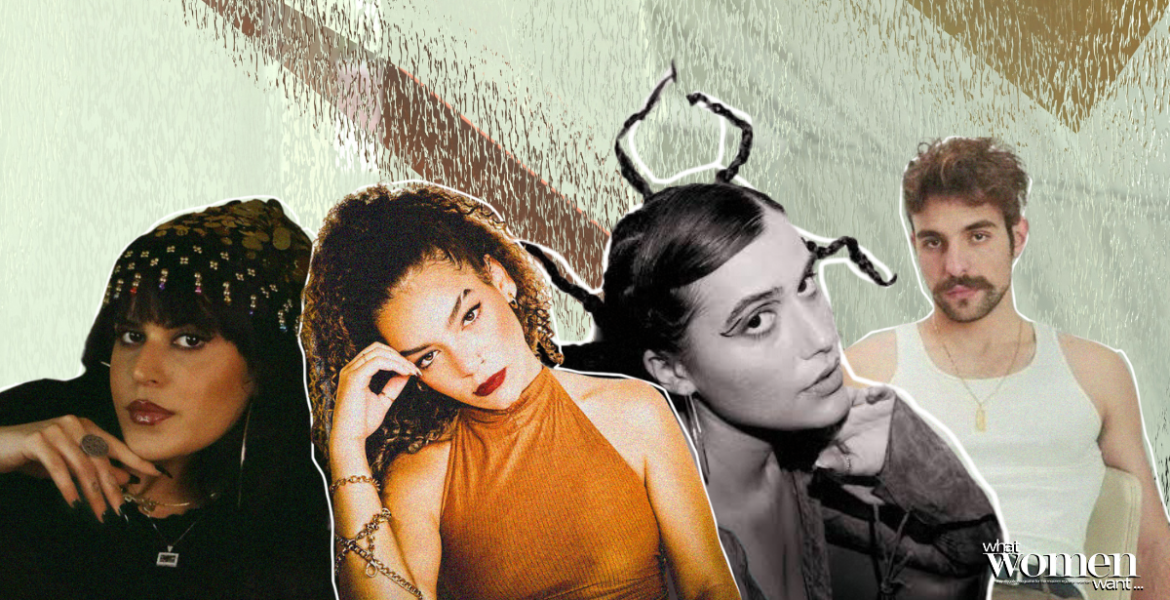The Arabic sound has always been influential and powerful. It was a tool to express identity, culture, and tradition. It is in every part of our culture- in weddings, births, and graduations. As time passed, our identities became more complex and interconnected. The rising voice in Arab music echoes the intricate identities of multicultural Arabs and North Africans via her emotive lyrics, unique beats, and beautiful melodies.
Saint Levant

“Dreamin we could make a living
We may call it home, but it isn’t
Living a life full of hate
Dont you talk about forgiving”
Saint Levant, also known as Lover Boy Levant, born Marwan Abdel Hamid, is a Palestinian, French, Algerian, and Serbian artist based in California, USA. The trilingual artist was born in Palestine during the Second Intifada. His family was forced to flee to Jordan in 2007, where he spent more than 10 years before moving to California. The 23-year-old artist has been making music since 2020. ‘Jerusalem Freestyle’, his first single released, amassed hundreds of millions of streams. He first became a global sensation after his song ‘Very Few Friends’ went viral on TikTok and Instagram. The blend of English, Arabic, and French combined with a funky and smooth beat make it a great hit among Gen Z. The Gaza native speaks openly about exploring his Palestinian identity through his music. He is restructuring and reforming the deformed image people have of Palestine and its people in today’s world.
Lana Lubany

“There’s something in my mirror
And it lacks a soul
It whispers in my ear, “You’re all alone””
Lana Lubany is a Palestinian-American artist who is breaking all the rules of pop and blending English and Arabic seamlessly. Lubany grew up in Palestine, where she was always surrounded by music. She began writing songs at a mere 11 years old. She was a member of a peace choir group that was known for signing for politicians, most notably, former US president Barack Obama. The talented artist moved to the United Kingdom to study music and settled there. She first began to go viral after her song, ‘The Snake’ took Tiktok by storm. It was her first bilingual track mixing alternative and pop beats. She accredits the success of the song to the fact that it showcased her heritage.
Nadine El Roubi

“Speak to my management speak to Megatronic
And when you speak on me
Put some mashAllah on it”
Nadine El Roubi, a Sudanese Independent rapper, is defying Afro-Arab Taboos. El Roubi was born in Khartoum to a Sudanese-Egyptian mother and a Sudanese-Iranian father. Growing up she was a lover of art, she wanted to be a fashion designer, a writer, to work in theater and film. But, music was the one that struck a chord. The 27-year-old rapper made her name with outspoken lyrics, bold themes, and fierce style. Her songs encompass a range of sounds, with themes of self-love, human connection, and self-discovery. She frames her work through the lens of a third-culture Afro-Arab. In her mixtape ‘Freestyles Pt. 1’, she welcomes her fans and the entire world to her diary to skim through it.
Perrie El Hariri

“أقودك Easy عاميني حماس فـ
تبص تقول البت دي أيقونة
اللعبة Queen تبص تقول
كل تراك ينزل تعلى”
Perrie El Hariri is a multi-talented Egyptian artist. El Hariri grew up in an artistic household, with her father late Egyptian actor Omar El Hariri. At first, she wanted to be a doctor, but the freedom of music caught her love. She can write, produce, and mix her own songs. She first rose to fame after her single Shigella went viral. It was a clear retort to Tameem Youness’s Salmonella, which was a controversial track about how men respond to rejection from women. Shigella’s lyrics call out men’s disrespectful behavior towards women, which remains true to this day. With one of her tracks leading Spotify’s Equal Arabia playlist, which has Perrie’s face on its cover, it seems the world is primed to listen to what she has to say.

